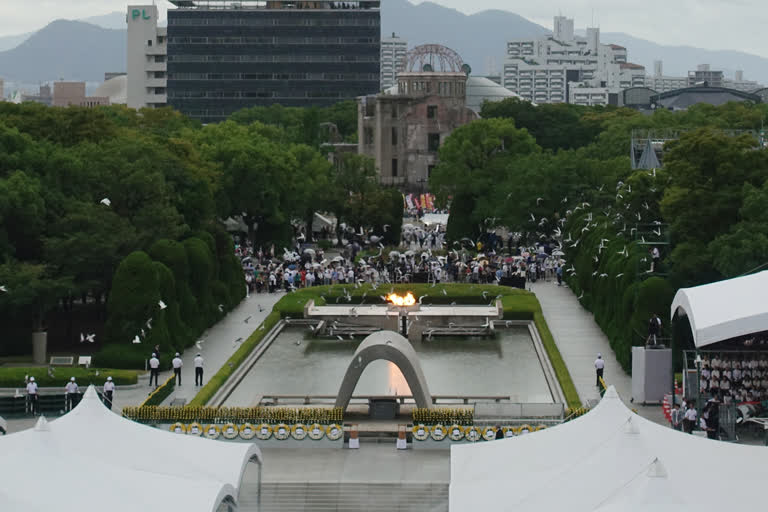Nagasaki: Nagasaki on Friday marked the 74th anniversary of its atomic bombing by the US at the end of World War II in 1945, with the city's mayor urging the Japanese government to immediately sign a UN treaty banning nuclear weapons.
A moment of silence was observed at 11.02 a.m., the exact time on August 9, 1945, when a plutonium-core atomic bomb codenamed "Fat Man" dropped by a US bomber exploded over the southwestern Japan city, three days after Washington dropped the world's first deployed atomic bomb on Hiroshima.
"As the only country in the world to have experienced the devastation caused by nuclear weapons, Japan must sign and ratify the Treaty on the Prohibition of Nuclear Weapons as soon as possible," Tomihisa Taue said.
The mayor spoke at the annual ceremony held at the Peace Park which was attended by 5,200 people and representatives from around 70 countries including all five recognized nuclear powers Britain, China, France, Russia, and the US as well as the UN and the European Union.
The mayor had urged the central government to sign the international treaty at the two previous annual ceremonies, but this year he used a stronger and more direct expression.
The treaty was adopted on July 2017 by 122 UN members but is not yet in force as it has not been ratified by the required 50 states.
According to the reports, Japan has refused to sign the treaty along with other countries under the US nuclear umbrella, as have the world's nuclear weapons states.
Prime Minister Shinzo Abe pledged that Japan would continue its efforts to be a "bridge between nuclear-weapon states and non-nuclear weapon states" and realize a world without nuclear weapons.
But he did not refer to the treaty.
The anniversary ceremonies in the two Japanese atom-bombed cities were held amid rising concerns about a new arms race following the US' formal withdrawal last week from the Intermediate-Range Nuclear Forces Treaty signed with Russia in 1987.
Taue also called on the US and Russia to "assume responsibility as nuclear superpowers by demonstrating to the world concrete ways to drastically reduce nuclear stockpiles".
An estimated 74,000 people had died as a result of the atomic bombing of Nagasaki by the end of 1945.
The combined number of surviving 'hibakusha' or survivors from the two atomic bombings stood at 145,844 as of March, down about 9,000 from a year earlier.
Read more: US: Joseph Maguire named new acting national intel director



